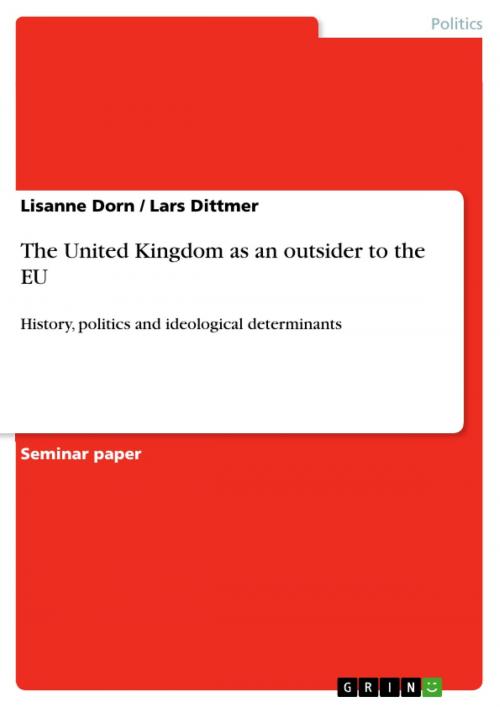The United Kingdom as an outsider to the EU
History, politics and ideological determinants
Nonfiction, Social & Cultural Studies, Political Science| Author: | Lisanne Dorn, Lars Dittmer | ISBN: | 9783638066143 |
| Publisher: | GRIN Verlag | Publication: | June 19, 2008 |
| Imprint: | GRIN Verlag | Language: | English |
| Author: | Lisanne Dorn, Lars Dittmer |
| ISBN: | 9783638066143 |
| Publisher: | GRIN Verlag |
| Publication: | June 19, 2008 |
| Imprint: | GRIN Verlag |
| Language: | English |
Seminar paper from the year 2007 in the subject Politics - International Politics - Topic: European Union, grade: 1,3, University of Potsdam (Institut für Sozialwissenschaften), course: Europa in der Krise - welche Krise, 20 entries in the bibliography, language: English, abstract: Britain has had the same foreign policy objective for at least five hundred years - to create a disunited Europe. ...It was necessary for us to break up the EEC,... . Now that we're in, we were able to make a pig's breakfast out of it. (The Complete Yes Minister, qtd. In Otte 1) The essence that this sarcastic quotation transports, brushing away all party politics, great leaders and platform commitments, suggests that Euro-scepticism has always been in Great Britain's political culture and it is here to stay. Intrinsic motifs and reasons for the British Euroscepticism will be dealt with in part I of this paper and indeed, they constitute strong evidence that the rejection of Europe - not only of the EU as a political instrument - is firmly entrenched in major parts of the UK's society. To assume however that this sentiment has been equally present in all the political phases and parties in post WWII Great Britain is scientifically unsustainable. It becomes obvious especially if one considers the pro-European mood in the devolved Scottish Parliament and the parties represented in it, eg. The Scottish National Party and the Liberal Democrats (Watts/Pilkington 222, 243). Also on UK level the political approach towards the EU and its institutions has changed with the political personal in charge, intergovernmental relations and constellations; it is true especially in regard of the UK that the lines of approval and rejection of the EU are not congruent with party loyalities. t is therefore the task of this paper to distil ideological determinants and mind-sets and the crucial phases in British policies towards the European Union after World War II. Focus in part one lies on Britishness and its surrounding ideological patterns; part two at its core examines the last three governments of the United Kingdom, that is the administrations of Margaret Thatcher, John Major and Tony Blair. It will be one of the statements of this work that both of the subsequent governments in many respects can be seen in the tradition of the first mentioned, although it was then indicated in another way and hoped by many pro-Europeans that this would not be the case. Furthermore one aim will be to isolate a tendency that enables the percipients of this academic work to venture an outlook on the future relations between Europe and the UK, which is especially vital in regard of the sustainability of the Union:
Seminar paper from the year 2007 in the subject Politics - International Politics - Topic: European Union, grade: 1,3, University of Potsdam (Institut für Sozialwissenschaften), course: Europa in der Krise - welche Krise, 20 entries in the bibliography, language: English, abstract: Britain has had the same foreign policy objective for at least five hundred years - to create a disunited Europe. ...It was necessary for us to break up the EEC,... . Now that we're in, we were able to make a pig's breakfast out of it. (The Complete Yes Minister, qtd. In Otte 1) The essence that this sarcastic quotation transports, brushing away all party politics, great leaders and platform commitments, suggests that Euro-scepticism has always been in Great Britain's political culture and it is here to stay. Intrinsic motifs and reasons for the British Euroscepticism will be dealt with in part I of this paper and indeed, they constitute strong evidence that the rejection of Europe - not only of the EU as a political instrument - is firmly entrenched in major parts of the UK's society. To assume however that this sentiment has been equally present in all the political phases and parties in post WWII Great Britain is scientifically unsustainable. It becomes obvious especially if one considers the pro-European mood in the devolved Scottish Parliament and the parties represented in it, eg. The Scottish National Party and the Liberal Democrats (Watts/Pilkington 222, 243). Also on UK level the political approach towards the EU and its institutions has changed with the political personal in charge, intergovernmental relations and constellations; it is true especially in regard of the UK that the lines of approval and rejection of the EU are not congruent with party loyalities. t is therefore the task of this paper to distil ideological determinants and mind-sets and the crucial phases in British policies towards the European Union after World War II. Focus in part one lies on Britishness and its surrounding ideological patterns; part two at its core examines the last three governments of the United Kingdom, that is the administrations of Margaret Thatcher, John Major and Tony Blair. It will be one of the statements of this work that both of the subsequent governments in many respects can be seen in the tradition of the first mentioned, although it was then indicated in another way and hoped by many pro-Europeans that this would not be the case. Furthermore one aim will be to isolate a tendency that enables the percipients of this academic work to venture an outlook on the future relations between Europe and the UK, which is especially vital in regard of the sustainability of the Union:















